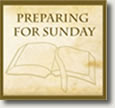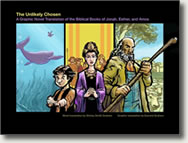The Heart of the Matter
 But the Lord said to Samuel, “Do not look on his appearance or on the height of his stature, because I have rejected him; for the Lord does not see as mortals see; they look on the outward appearance, but the Lord looks on the heart.”
But the Lord said to Samuel, “Do not look on his appearance or on the height of his stature, because I have rejected him; for the Lord does not see as mortals see; they look on the outward appearance, but the Lord looks on the heart.”
– 1 Samuel 16: 7
How easy it is for us to judge by outward appearances. Even God’s prophet Samuel sees Eliab, Jesse’s tall and accomplished eldest son, and thinks—surely, this is God’s chosen. Samuel is fooled by Eliab’s stature and predicts wrongly. Eliab is not the man God has selected as Saul's successor.
Plainly, God has God’s own standards. The next king will be David, a shepherd boy, the youngest son from this humble family living in Bethlehem. In choosing, God looks below the surface to what's inside the heart.
So often we think we know someone based on their appearance or background. We look first at their race, their physical attractiveness, their hair style and clothes. And then we examine the schools they attended, what neighborhood they live in, what part of the country their family calls home. These surface observations form our decision as to whether they’re capable of performing the task at hand, whether they’re suited to our needs, whether they’re worthy of our time and attention.
But God looks deeper. Time and again throughout the Bible, God picks the most unlikely person to do God’s work. Our charge too is to look deeper, to see beyond outward appearances and to value all those who pass before us.
When our hearts are open to God’s love, God works wonders through us. Our hearts are what define us, not our height, our lineage or our accomplishments.
If we are to love our neighbors, before doing anything else we must see our neighbors. With our imagination as well as our eyes, that is to say like artists, we must see not just their faces but the life behind and within their faces. Here it is love that is the frame we see them in.
— Frederick Buechner
Whistling in the Dark: A Doubter's Dictionary
We need never worry that we don’t measure up. We can walk with assurance before God, because we too, are “the one.’” Not because we’re better than anyone else, but because God has peered lovingly into our heart and seen there what we are made for.
Do not show partiality in judging; hear both small and great alike. Do not be afraid of any man, for judgment belongs to God. —Deuteronomy 1:17 NIV
If you judge people, you have no time to love them. — Mother Teresa
Jesus' lesson for the first century, for our century, and for future centuries is that diverse peoples must learn to desire to pass beyond their individual understandings of reality and reorient themselves in the ways of God, who allows the sun to rise on the evil and the good; who sends the rain on the righteous and on the unrighteous. Jesus is teaching us a hard lesson: If we can love the other, those of other cultures, other nations, even other worldviews, we will open ourselves to the higher reality that we are all children of God.
—Michael Battle
excerpted from Practicing Reconciliation in a Violent World
You, then, why do you judge your brother? Or why do you look down on your brother? For we will all stand before God's judgment seat. —Romans 14:10
Freedom—personal freedom—comes from knowing who we are and where we are going. We are free from being affected by other people's judgment of us.
—Ward B. Ewing
What is the meaning and purpose of Ash Wednesday?
Our job is to love others without stopping to inquire whether or not they are worthy. That is not our business and, in fact, it is nobody's business. What we are asked to do is to love, and this love itself will render both ourselves and our neighbors worthy.
To believe in the sanctity of each human life created in the image of Life will result in our judging people less harshly and treating our friends and even strangers more fairly.
Be completely humble and gentle; be patient, bearing with one another in love.
—Ephesians 4:2
Gracious One, may we honor the freedom you have given each of us, by refusing to judge those who are different from us. —excerpted from Prayers for Freedom
As long as you are proud you cannot know God. A proud man is always looking down on things and people: and, of course, as long as you are looking down you cannot see something that is above you.
— C.S. Lewis
Mere Christianity



